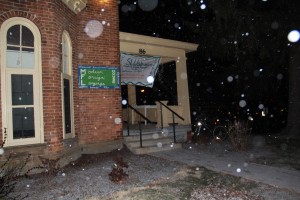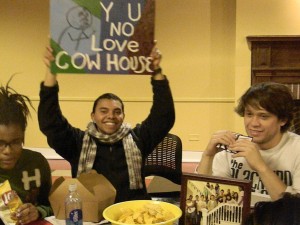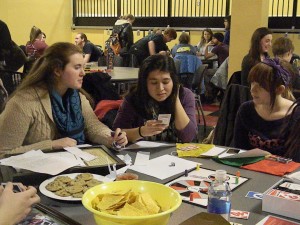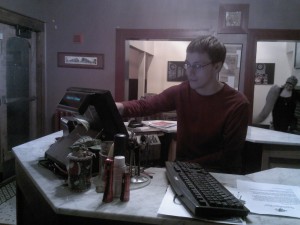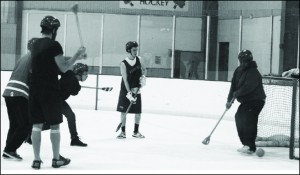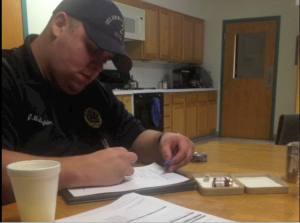
By Samantha Simon
Transcript Reporter
Captain Jennifer Cochran starts her 24 hour duty at 6 a.m. every third day of the week, and she wouldn’t trade her career for anything.
It is the job where you can be watching MTV’s Buckwild one minute, and on the scene of a fatal car accident the next.
It is the life of a paramedic.
“I work 10 full days a month and get to really help people, I wouldn’t trade it for any other career,” Cochran said.
Cochran knew she wanted to be a paramedic in high school, so she decided to ride along with someone she knew in the fire department to make sure it was the right fit for her.
She loved the energy and it felt right, so she began her first EMT-B class. Upon completion of the course and obtaining a license, she worked for a private ambulance service and then joined Delaware County EMS in 1997. Cochran was promoted to Lieutenant in 2000, and then to captain in 2011.
As Captain Cochran said she was able to expand what she calls her second family, as she oversees a larger group of crew members throughout the county.
“We spend a third of our lives together,” she said. “We fight, we take care of each other and we look out for each other.”
Cochran doesn’t exaggerate when she said she treats her crew like family. Cochran’s morning began at Coldstone Creamery to pick up a cake for Chuck’s birthday, a paramedic stationed at medic 7 in Harlem Township.
“I usually bake cakes for everyone’s birthday, but recently have just run out of time,” Cochran said.
Cochran said she has gotten anywhere from zero to 13 calls in a 24 hour shift. This shift appears to be a little different for her as I will be riding along, observing but not intervening.
I am told to stay in the vehicle unless I am told it is clear, and to remove myself if I feel I cannot stomach what is happening.
The two crew members on duty, Justin McLaughlin and Keith Tussey, said they have seen “just about everything.”
“The ones involving children are the worst,” McLauglin said. “Those are the ones that really stay with you.”
McLaughlin thinks back and remembers some really ridiculous circumstances that he witnessed.
Tussey and McLaughlin have been on hundreds of calls together, they tell me, and begin laughing in remembrance.
“The zit incident was probably the stupidest one,” they recall.
I sit wondering what the zit incident could even mean. They explain that a trucker at 2 a.m. had a zit that “wouldn’t stop bleeding,” so they took him to the hospital.
The two reminisce about calls they’ve had, pausing, to either laugh or remark on how serious or dangerous the situation really was.
“Delaware County is a tremendous place when it comes to resources made available to first responders and paramedics; we have about fifteen units just in this county and the population is only at 100,000,” McLaughlin said.
“You can’t throw a cat in the city without a unit responding,” he said. “We are also fortunate with the quality and range of hospitals nearby; Riverside has a great cardiac program, along with the burn center at OSU. We can transport two patients safely, but there are so many medics around here it’s not done very often.”
Tussey said that they both have kids so when they go home at 6 a.m. it’s nice because they’re still asleep.
“I’d rather have 24 hour shifts, than eight hour shifts and the only thing that really does pose a major problem, is that every third Christmas and Thanksgiving we have to work,” Tussey said.
Each county truck has three paramedics.
“Jenny tries to be the boss of us; we give her a rough time because we joke around a lot,” Tussey said. “She has to go on most calls, and when she is not needed she still often comes to supervise us. She cares about her job and the people we serve.”
Cochran tells me it is time to deliver the birthday cake, and I hop into her truck with my DCEMS jacket on, feeling slightly overwhelmed.
The ice cream cake sitting in the back next to a first-aide bag may have not been the right choice if we need to quickly respond to a call.
Cochran may not have thought the ice cream cake through because this is her life; she squeezes these errands in throughout the day with the ongoing possibility of needing to respond quickly to a scene whether it is life threatening or just routine.
Pulling up to Medic 7 in Harlem Township, a more rural area, seems quiet and slow paced, but boy am I wrong.
Birthday boy Chuck McNaab is inside with a wide-grin after receiving his red velvet-strawberry ice cream cake.
Cochran asked McNaab to give me a tour of their headquarters, and the tour turns into McNaab’s life story of becoming a paramedic.
“We are paid for what we are willing to do,” he said confidently. “Back in the day there was no guarantee you could get medical care, prior to that funeral homes had a bed in the back of the car you could hop on and they’d drive you to the hospital. Now, Delaware County has more than enough resources.”
“I started in 1997, and have been here 15 years now, I’ll be sixty when I can retire,” McNaab said. “But that’s ok, because I love this work.”
He also went on to explain how he quit the fire department because he got too banged up and it was taking a toll on his body.
“Doing EMS is a whole lot healthier, aside from back injuries,” McNaab said.
McNaab made a point of saying that patients come before pride.
“When someone is hurt we will work together to get the job done,” he said. “Sometimes after a call where someone dies we often say that we ‘killed one today,’ we may employ humor as a defense mechanism. We have debriefings for the really disturbingly gory things, but we also have our crew mates to depend on, and look to for support.”
McNaab said that sometimes patient stories really stay with you.
He told me about an alcoholic woman in the area who they would get called to at least once a week. Shaking his head, McNaab said that this woman treated the crew the same way every time, where she made two of the crew members bad guys and one would be the good guy.
“I like you, the other two, well those guys steal from me, and I know you can help me,” he said, mocking the woman.
“It is always something with her, but then we saw her out on a different call where she sober and not the patient,” McNaab said. “She said she was sorry and that she would bake us some cookies and sure enough she baked us the cookies, but then two weeks later we were back at her house and I was the ‘idiot’ again. That’s part of the job and you just really can’t let it get to you.”
“We have to go, we got a run,” said Cochran, hurrying in the room.
I hopped in the truck and learned there was a gas leak at a church, and Cochran will need to stage the scene in case anyone gets hurt.
“We are the furthest away we could possibly be,” said Cochran, as she stepped on the gas and the lights and sirens wailed.
I sat and watched the road as cars pulled over for us, reminding myself of why I am in this vehicle. While in route, the dispatcher told us that the call was cancelled and we were no longer needed.
Cochran asked me if I felt scared at all. Immediately I told her no, but also realized there was no time for panic, and understood what the paramedics had been explaining to me all day. That it is a job that cannot allow you to insert your own fears and anxieties into the situation. That to do so, would negatively affect the care of the patient, and would also make the job even more challenging than it already is.
“You get the sad ones.” Cochran said. “You get the ones where you get to save people, you also get to change people’s lives and intervene, we change showerheads, we clean bathrooms and you do it because you care and it is your job. One of the paramedics even calls to check up on his patients after two or three days to see how they are doing”.
“I try to not let any call get to me,” Cochran shrugs. “We go on so many runs we need to view every situation as an emergency and not panic, because if we panic everybody else panics. You have to be calm. I once thought about being a nurse, but the constant changing aspect of this job is what I love, and I could never be in a hospital all day.”
Paramedics live the life of a normal person for much of the day. One minute they are at a familiar Taco Bell, eating something they probably wouldn’t recommend to their patients, and the next minute they are at a suicide shooting wearing a bullet proof vest.
McLaughlin, jokingly said that his wife told him they are only married today because he goes away every third day.
Paramedics possess true dedication. They offer an unparalleled level of care to both their patients and their colleagues.

